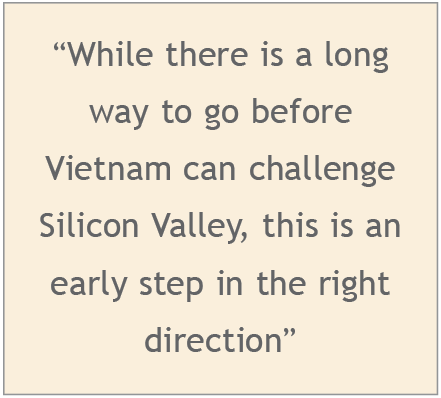 By Pham Minh Tien, Indochine Counsel
By Pham Minh Tien, Indochine Counsel
E: tien.pham@indochinecounsel.com
On June 12, 2017 the National Assembly of Vietnam issued Law No. 04/2017/QH14 on supporting small and medium-sized enterprises (the SME Support Law), which took effect on January 1, 2018.
Criteria for identification of an SME
According to the SME Support Law, the SME includes micro-enterprises, small enterprises and medium-sized enterprises with an annual average number of employees participating in social insurance not exceeding 200, and which satisfy one of the following criteria:
(i) Total capital is not greater than Vnd100 billion; or
(ii) Total turnover of the immediately preceding year does not exceed Vnd300 billion.
General supports for SMEs
In each period, the government will decide the policies on supporting financial institutions to increase the outstanding loan balance to SMEs. In addition, SMEs shall be granted credit guarantee from the Credit Guarantee Fund, which is a non-budget state financial fund and is established by provincial People’s Committees. This guarantee for SMEs shall be based on the security assets or the feasible business plan or credit ratings of the SME.
Furthermore, SMEs shall be granted a preferential tax rate for a definite duration, which is lower than the normal tax rate applicable to enterprises. With respect to legal assistance, the ministries shall establish the network supplying SME consultancy services and the fee shall be exempted or reduced for SMEs.
Beside the general support discussed above, the SME Support Law also provides for other support to SMEs on accounting regimes; ground spaces for production; technology, incubators, technical facilities and co-working spaces; information access; etc.

Support for the SMEs in conversion from household businesses
An SME that converts from a household business shall be supported for free consultancy and direction for establishment of enterprises. SMEs shall further be exempted from enterprise registration fees and other fees. For the purpose of receiving such support, SMEs that have converted from a household business must satisfy the following conditions:
(i) the household business is legally registered and operated before the conversion; and
(ii) the household business has been operating continuously for at least one year by the day on which the first Enterprise Registration Certificate (ERC) is issued.
Support for the start-up SMEs
A start-up SME that has operated for less than five years from the date of issuance of its first ERC and has not made any public offer in the case of joint stock companies shall be supported by the government in terms of technology (ie, technology application and transfer, use of equipment at a technical facility, co-working space participation support, etc), training (ie, in-depth practical training on product construction and development, investment attraction, etc) and other forms of support.
The SME Support Law provides the legal framework for investment in start-up SMEs. The investor in a start-up SME includes venture capital funds and domestic and foreign organisations and individuals. Such investors shall be exempted from corporate income tax for a limited period of time. However, the investment in a start-up SME is limited to not more than 50 percent of charter capital.
Supporting SMEs in participating in industry clusters and value chains
Under the SME Support Law, the contents of support for SMEs in industry clusters and value chains shall comprise in-depth training in production technology and techniques; information on the need for connection, production and business of the SME; support for brand development and for expansion; etc. SMEs shall be entitled to support on satisfaction of either the following conditions:
(i) creating products with competitive advantages in terms of quality and prime cost; and
(ii) creative innovation in technological processes, materials, components, machinery and equipment.
As SMEs have long been a factor in regions with good records of investment, we are hopeful that this new supports for SMEs will offer the chance to open Vietnam to further investment. While there is a long way to go before Vietnam can challenge Silicon Valley, this is an early step in the right direction.

W: www.indochinecounsel.com
E: tien.pham@indochinecounsel.com
Ho Chi Minh City Office
T: (84) 28 3823 9640
F: (84) 28 3823 9641
Hanoi Office
T: (84) 24 3795 5261
F: (84) 24 3795 5262




































 Dang The Duc
Dang The Duc To Xuan Tinh
To Xuan Tinh Le Nguyen Huy Thuy
Le Nguyen Huy Thuy







